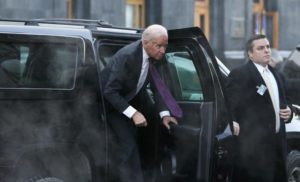by WorldTribune Staff, January 16, 2017
The past, present and future policies of the United States on the Eastern European front came to a head days before the transition of power in the U.S.
In his final foreign trip, Vice President Joe Biden visited Kyiv on Jan. 16 and urged the incoming Trump administration to continue sanctions on Russia over its invasion of Ukraine.

Meanwhile, in an interview with The Times of London and the German magazine Bild published on Jan. 15, President-elect Donald Trump suggested he may offer to roll back sanctions against Russia in return for a deal with Moscow to reduce nuclear arms.
Moscow also welcomed Trump’s remarks in the interview in which he referred to NATO as “obsolete.”
“NATO is indeed a vestige [of the past] and we agree with that,” Russian President Vladimir Putin’s spokesman, Dmitry Peskov, said.
Peskov added: “Considering that [NATO] is focused on confrontation and its entire structure is devoted to the ideals of confrontation, then, of course, this can hardly be called a modern structure meeting the ideas of stability, sustainable development, and security.”
Biden, in his sixth visit to Ukraine during President Barack Obama’s eight years in office, said U.S. sanctions imposed on Russia for its seizure of the Crimean Peninsula and its involvement in a war between government forces and pro-Moscow separatists in eastern Ukraine must remain in place until Moscow fully implements its commitments under a 2015 peace deal known as the Minsk accords.
Russia, Biden said, has used corruption as a “tool of coercion” to keep Ukraine within its sphere of influence. Fighting corruption is not just a matter of good governance, it is essential for self-preservation and security, he said.
Obama on Jan. 13 extended sanctions against Russia for a year, through March 2018 – a move that means Trump will have to cancel them rather than just letting them expire in a few weeks if he wants to abandon them, as he has indicated he might.
Trump said in a wide-ranging interview with the British daily The Times and the German daily Bild that NATO is “obsolete” for not doing more to fight terrorism but added that the alliance is still “very important to me.”
“I said a long time ago that NATO had problems,” Trump told the newspapers. “It’s obsolete, first because it was designed many, many years ago. Secondly, a lot of [NATO member] countries aren’t paying what they should.” Trump called that “unfair” to the United States but added that the United States has to protect the other countries in the 28-member alliance.
Germany, one of the United States’ closest NATO partners, expressed concern over Trump’s remarks.
German Foreign Minister Frank-Walter Steinmeier said “this is in contradiction” with what Trump’s nominee to lead the Pentagon, James Mattis, said during his Senate confirmation hearing last week. Mattis on Jan. 12 called NATO “the most successful military alliance probably in modern history, maybe ever” and said Russia poses a threat to it.
NATO reacted on Jan. 16 to Trump’s statement by saying it has full confidence in the U.S. security commitment to Europe. NATO spokeswoman Oana Lungescu said alliance chief Jens Stoltenberg was looking forward to working with Trump and his team.
